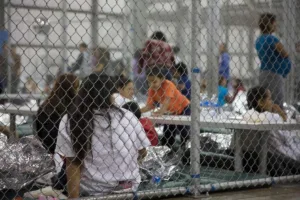By : AV Press Releaseson : December 4, 2024
Washington, DC — There is a daily drumbeat of coverage about the growing consensus and fear that Donald Trump’s signature policy agenda – promoting mass deportations, stripping protections from millions of immigrants here legally and threatening massive tariffs related to immigration flows – will hit key American industries and consumers hard, spike inflation and devastate the U.S. economy.

Fissures and divides are starting to emerge as business and industry voices speak out (see examples below) and assess the potential damage of the Trump immigration crackdown – including among Trump world figures Elon Musk and fellow tech allies and Stephen Miller and the nativist crusaders inside the MAGA movement.
According to Douglas Rivlin, Senior Communication Director for America’s Voice:
“As Donald Trump’s signature policy agenda comes into sharper relief, divisions are emerging among leading components of the GOP coalition as business interests and whole economic sectors in the crosshairs face the reality of the Trump immigration agenda.
The Trump and Stephen Miller detailed plan to deport millions of people who live and work here will harm every American: spiking inflation, driving up deficits, cutting tax revenues, cutting consumer demand, wreaking havoc on a host of industries, and shrinking GDP and employment alike.
Families already stretched to find affordable care options for children, the elderly and the sick will face even higher obstacles if much of that workforce faces the possibility of family separation, incarceration and deportation, especially in red states where governors or local leaders actively participate in the deportation operation. From health care and child care givers to construction workers to agriculture workers harvesting our crops and putting food on our table, the impact on American households will be broad and painful. And these are just a few of the key sectors where immigrants are essential to the continued vitality, growth, and dynamism of the United States.
We expect buyer’s remorse from voters when their wallets, neighborhoods and congregations are touched by Trump’s deportation plans, but it is not too late for key leaders inside the Republican coalition in business, faith, government and law enforcement sectors to speak out against the impending damage.”
See below for examples of industry and business leaders highlighting the negative impact of the coming Trump agenda:
Axios article by Tina Reed, “Trump’s immigration crackdown could reduce caregiving workforce,” noting:
“Some of the earliest and lasting effects from President-elect Trump’s promised immigration crackdowns would be in home health and long-term care, both of which rely on a substantial number of immigrants and undocumented workers … Reducing an already thin labor market could have serious ramifications for aging adults or those with disabilities — and potentially put more stress on family caregivers.
… ‘IImmigration policy is long-term care policy,’ said David Grabowski, a Harvard Medical School professor who’s chronicled how foreign-born workers filled key nursing home roles early in the pandemic. He found nursing homes in regions with a higher share of foreign-born nursing assistants provided more direct care and better quality. ‘If you were to tighten up immigration or begin deporting individuals, it’s going to lower the available workforce, and this is only going to add to an already challenging labor situation,’ he said.’ … Between 2021 and 2031, the long-term care sector will need to fill 9.3 million direct care job openings as demand grows and workers exit the field, according to PHI, a research group that studies care workers.”
Wall Street Journal article by Elizabeth Findell and Gina Heeb, “Construction Industry Braces for One-Two Punch: Tariffs and Deportations, noting:
“[T]he construction industry [is] particularly vulnerable to President-elect Donald Trump’s vow to deport millions of undocumented immigrants, and his threats to introduce new tariffs on Mexico and Canada.
‘We will absolutely have a labor shortage,’ said George Fuller, a longtime Texas developer who is also mayor of McKinney [TX]. ‘Whether you want to acknowledge it or not, these industries depend on immigrant labor.’
The McKinney mayor, who describes himself as a Reagan Republican, said he would prefer all workers to be documented and would like to see more materials produced in the U.S. But he said he thought a heavy-handed approach of deportations and tariffs would be a painful way to advance those goals.”
Washington Post article by Mary Beth Sheridan and Valentina Muñoz Castillo, “From beer to barley: How Trump’s tariff threat could affect your wallet,” noting:
“Trump said last week he would slap a 25 percent tariff on goods from Mexico and Canada if they didn’t stop the flow of migrants and the deadly opioid fentanyl over their borders. Such penalties would cause real pain to those countries, which are the top two U.S. trade partners.
But American consumers would be hurt, too, according to economists. Tariffs are basically a tax on foreign goods; importers probably would have to raise their prices to compensate.
Mexico makes all kinds of things the average American uses. It manufactures 88 percent of the pickups sold in America; a 25 percent tariff could add about $3,000 to the price tag of that new Ford or GM truck, Mexican Foreign Minister Marcelo Ebrard said last week. Mexico supplies around half of America’s imported fruit and two-thirds of imported vegetables, in dollar terms — tomatoes, berries, bell peppers, cucumbers.”
Additional Economic Resources
- Watch a recording of the recent virtual briefing: “Economists and Immigration Policy Experts Raise Alarm on the Catastrophic Long-Term Economic Consequences of Trump’s Mass Deportation and Immigration Plans”
- Read America’s Voice, “The Devastating Economic Costs of Mass Deportation and Slashing Legal Immigration”
- An American Immigration Council report on the costs of mass deportation finds it would cause GDP to drop by 4.2-6.8%, which is more than the Great Recession (see here).
- Also read The Boston Globe op-ed from leading expert Michael Ettlinger, “Trump’s plan to vaporize the economy” and find related economic analyses: “Literature Review on the Economic Consequences of the Deportation of Unauthorized Immigrants,” by Robert G. Lynch (Washington College – Department of Economics) and Michael Ettlinger (University of New Hampshire) and “The Economic Impact on Citizens and Authorized Immigrants of Mass Deportation” by Robert Lynch and Michael Ettlinger.




